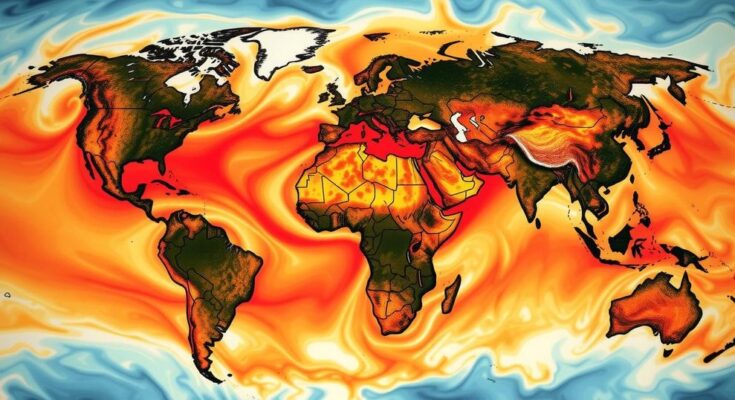Scientists confirmed that 2024 was the first year in which global temperatures surpassed 1.5 degrees Celsius above pre-industrial levels, marking a critical milestone in climate change. With every month recording unprecedented warmth, the dire implications of rising greenhouse gas emissions and increasing climate disasters necessitate urgent political action to address the ongoing climate crisis.
In 2024, the world experienced its first complete year in which average global temperatures surpassed 1.5 degrees Celsius above pre-industrial levels, as reported by the European Union’s Copernicus Climate Change Service (C3S). This unprecedented temperature rise has emphasized the effects of climate change, with every month in 2024 being the warmest or second-warmest on record. The average global temperature recorded was 1.6 degrees Celsius higher than during the period from 1850 to 1900.
This alarming trend has significant implications for global climate efforts, as governments have committed under the Paris Agreement to limit the temperature increase to below 1.5 degrees Celsius. However, the realization that 2024 marked a breach of this threshold highlights urgent challenges ahead, even if such an event does not officially invalidate long-term climate goals. Increased greenhouse gas emissions are propelling the planet toward further temperature rises, indicating that countries must act decisively to reduce emissions to avert further degradation of the climate.
The impacts of climate change have become increasingly visible across various regions, affecting diverse populations regardless of socioeconomic status. Recent disasters include wildfires in California that have resulted in fatalities and loss of homes, alongside catastrophic flooding in several countries. The record rise in atmospheric water vapor also correlates with extreme weather patterns, enhancing storms and flooding incidents, with C3S reporting unprecedented water vapor levels in 2024.
Despite the escalating costs related to climate disasters, political will to address these issues appears to wan, particularly in some countries. The situation is exacerbated by leaders who dismiss the scientific consensus on climate change, undermining the collective response necessary to mitigate its impacts. Experts emphasize that the 1.5-degree milestone should prompt critical political acknowledgment and action toward fulfilling climate responsibilities. Furthermore, rising carbon dioxide concentrations reaching 422 parts per million signal the urgent need for concerted global action to manage greenhouse gas emissions.
Looking forward, predictions for 2025 indicate a likelihood of continued high-temperature trends, although not exceeding the benchmarks set by 2024. It is critical that nations recognize the urgency of climate action to prevent further environmental degradation and societal consequences.
Overall, 2024 not only represents a notable year in climate history but also serves as a crucial juncture for global stakeholders to reevaluate and strengthen their commitments to effective climate strategies and sustainable practices.
The article discusses the significant global milestone reached in 2024, wherein average temperatures exceeded 1.5 degrees Celsius above pre-industrial levels, a threshold established by the scientific community as critical to mitigate severe climate impacts. This increase highlights a concerning trend in climate change exacerbated by human activities, particularly emissions from fossil fuels. The implications of this temperature surge are dire, affecting all nations and intensifying weather-related disasters. The context of the Paris Agreement underscores the urgent need for nations to implement robust climate strategies to manage and reduce greenhouse gas emissions to avert catastrophic climate changes in the future.
In summary, 2024 marked a pivotal year for climate change, with the world experiencing average temperatures surpassing 1.5 degrees Celsius, confirming the urgent need for immediate and effective action against greenhouse gas emissions. The multitude of adverse climate impacts observed across the globe underscores the interconnectedness of climate challenges, highlighting the necessity for international cooperation and commitment to achieving climate goals. Without decisive action, the trajectory of climate change poses severe risks to humanity and the planet at large.
Original Source: sightmagazine.com.au




